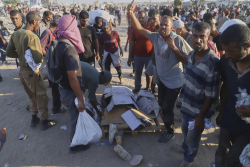While the region’s nations have reasons to pursue closer ties with Israel, they will most likely stop short of full diplomatic recognition.
President Donald Trump has often voiced support for expanding the Abraham Accords—the US-brokered normalization agreements between Israel and several Arab states—to include Azerbaijan and Central Asia. While this seems plausible for Azerbaijan, it remains a far-fetched prospect for Central Asia. Although mutual cooperation aligns with the interests of some Israelis and Central Asians, major geopolitical constraints make a full-scale diplomatic breakthrough unlikely. Central Asia will not become the next Azerbaijan.
Negotiations with Azerbaijan are reportedly advanced, reflecting a unique convergence of interests with Israel: shared hostility toward Iran and Baku’s conflict with Armenia. This dynamic does not apply to Central Asia.
Israel’s outreach to Central Asia echoes its “periphery strategy,” a Cold War-era policy of cultivating ties with non-Arab Muslim states (like Kemalist Turkey and Pahlavi Iran) to counter regional isolation. The 1979 Islamic Revolution in Iran and the USSR’s collapse a decade later dramatically altered Israel’s strategic environment. After anti-Israeli revolutionaries took power in Tehran, the Soviet breakup created five new secular, Muslim-majority states: Kazakhstan, Uzbekistan, Turkmenistan, Kyrgyzstan, and Tajikistan.
Israel sought to capitalize on this development, leveraging, in part, historical Jewish communities in the region—from Ashkenazi émigrés to Bukharan Jews (including ancestors of current Israeli foreign minister Gideon Sa’ar). Today, Central Asia offers Israel three key advantages.
First, there is diplomatic and energy diversification. Adding Muslim-majority UN and OIC members to the Abraham Accords could bolster Israel’s legitimacy in the Islamic world. Kazakhstan is also one of Israel’s primary crude oil sources—it supplies 22 percent of Israel’s oil imports through the Caspian Pipeline Consortium route.
Second, while Central Asia avoids antagonizing Tehran, mistrust of Iran’s Islamist model persists among its staunchly secular elites—a potential wedge for Israel to expand its regional influence.
Third, there is potential for strategic penetration. Israel’s 2023 embassy opening in Turkmenistan—bordering Iran’s Turkmen-populated region—signals ambitions to establish an intelligence foothold and potentially exploit Iran’s ethnic diversity. Influential Israeli voices advocate expanding support for Iran’s minority groups (Kurdish, Baloch, and Ahwazi) to undermine Tehran’s rule. While the success of including the Turkmen in this strategy is uncertain, the objective of weakening Iran’s ethnic cohesion remains clear.
For Central Asian governments, engagement with Israel reflects their pragmatic calculus. It can serve the region’s economic modernization. Israeli expertise in agriculture, water management, and cybersecurity aligns with regional needs, particularly in water-scarce Uzbekistan and Turkmenistan.
Ties with Jerusalem could also enhance the region’s diplomatic balancing. Participating in US-backed initiatives like the Abraham Accords could help Central Asia move away from overreliance on Russia and China while raising its profile in Washington.
Despite these incentives, four factors make full Central Asian accession improbable.
First, public opinion: While reliable surveys are scarce in Central Asia, its Muslim-majority populations—like others worldwide—have grown increasingly alienated by Israel’s Gaza campaign. Even authoritarian regimes heed such sentiment. Since the war began, attitudes hardened even in original accord states like the UAE and Bahrain, diminishing potential ties. Most Central Asian states have consistently backed UN Gaza ceasefire resolutions. While not a formal barrier to joining the accords, these governments clearly weigh the optics of embracing an increasingly isolated Israel.
Second, Israel’s attacks on Iran risk destabilizing trade and logistics routes that Central Asia relies on, particularly for transit to Persian Gulf ports, such as Bandar-Abbas and Chabahar in Iran. US sanctions and military pressure on Iran have already disrupted Central Asian supply chains, forcing costly detours through Russia or China—a reminder of the region’s vulnerability to Western-Iranian tensions. There is a sense in the region that joining the US-Israel campaign against Iran will inflict an economic cost with no offsetting compensation.
Third, while proponents of the accords highlight the Turkic connection as enabling Kazakhstan’s participation, this overestimates Azerbaijan’s role. Although Baku, a close Israeli ally, reportedly promotes Central Asian involvement, Turkey leads the Organization of Turkic States. Ankara’s anti-Israeli stance makes alignment difficult for Turkic Central Asia.
Fourth, Russian and Chinese pressure matters. While both maintain ties with Israel, US-backed Accords expansion would alarm Moscow and Beijing as encroachment in what they see as their sphere of influence. They would likely pressure Central Asia to restrain cooperation.
The likely outcome of the Abraham Accords is that Central Asia may pursue low-stakes collaboration with Israel, such as in agricultural technology and cybersecurity training, while avoiding bold diplomatic moves. Kazakhstan, the most plausible candidate, might stage a token signing ceremony—particularly if accompanied by diplomatic and economic benefits from Washington. Yet, no state will replicate Azerbaijan’s strategic embrace of Israel.
The accords’ expansion into Central Asia is more US-Israeli wishful thinking than a viable strategy. While Israel will persist and Central Asia may extract niche economic and security benefits, the region’s multi-vector balancing act—between the West, Russia, China, Turkey, Iran, and, increasingly, the Gulf monarchies—precludes major realignment. Trump’s move will yield Washington at best a symbolic win; at worst, the effort will expose its waning leverage in Eurasia. For Central Asia, cold interest trumps ideology and rigid alignments—and for now, the costs of prioritizing Israel over existing partnerships remain too high.
About the Author: Eldar Mamedov
Eldar Mamedov is a Brussels-based foreign policy expert. He has degrees from the University of Latvia and the Diplomatic School in Madrid, Spain. He has worked in the Ministry of Foreign Affairs of Latvia and as a diplomat in Latvian embassies in Washington and Madrid. Since 2009, Mamedov has served as a political advisor for the Social Democrats in the Foreign Affairs Committee of the European Parliament (EP) and is in charge of the EP delegations for inter-parliamentary relations with Iran, Iraq, and the Arabian Peninsula. Find him on X: @EldarMamedov4.
Image: Vladimir Tretyakov / Shutterstock.com.

















